A case study by a Rutgers Business School professor about a start-up enterprise in Pakistan and its quest to be self-sustaining after 12 months has won first place in the WDI 25th Anniversary Case Competition.
“Roshni Rides: Pricing Transportation for the Underserved,” by Can Uslay examined how the enterprise, which provides affordable, dignified transportation to refugees and was awarded the $1 million Hult Prize in 2017, dealt with many challenges as it prepared to launch. For the case, Uslay followed the Roshni Rides team as it tried to find a price point that made it affordable to its customers while also generating enough money to make future expansion possible.
“Roshni Rides wants to restore the dignity of refugees by providing accessible, affordable, and reliable transportation, one ride at a time,” Uslay said. “For me, it was great to be able to create a case study to convey their powerful story which will resonate with more people as a result of this win.”
The case competition celebrated and commemorated WDI’s 25th anniversary in 2017 and its long history of developing market-based solutions in low- and middle-income countries around the world. It was open to students and faculty individually or on teams, and had to describe a dilemma or challenge faced by a company or organization related to creating, implementing, evaluating and/or disseminating market-based solutions in developing countries.
“By rolling out this competition globally, we not only invited case study submissions focused on WDI’s mission, but also created awareness of WDI and its 25-year history, ” said Sandy Draheim, manager of WDI’s case publishing and marketing. “Entrants included faculty and/or students from 10 countries representing over 40 different universities.”
The first round of judging was completed by an internal WDI team. However, the final winners were determined by an esteemed group of academic professionals which included Kim Bettcher, director of knowledge management at the Center for International Private Enterprise, and John Branch, Gautam Kaul, and Jordan Siegel, all professors at the University of Michigan’s Ross School of Business.
The second-place winners were Fernando Roxas and Andrea Santiago from the Asian Institute of Management in the Philippines. The pair wrote, “Milking the Future: DVF Dairy Farm Partners with the Filipino Farmer,” that explored whether Filipino farmers would be able to produce sufficient quantity and quality of carabao (water buffalo) milk to satisfy the demands of the DVF Dairy Farm customers.
In third place was “Chanderiyaan: Weaving Digital Empowerment into the Indian Handloom Industry,” by three professors from the FORE School of Management in India. The case, written by Bishakha Majumdar, Sriparna Basu and Shilpi Jain, studied a successful 15-year-old handloom enterprise as its founder considered making it an independent, self-sustaining social enterprise.
Uslay was awarded $3,500 for his first place win and donated the winnings to the “noble mission” of Roshni Rides, he said. The second place team won $2,500 and third place was awarded $1,000. Additionally, each winning case was professionally published by WDI Publishing.
Uslay knew about Roshni Rides because one of his students was the organization’s chief marketing officer. Uslay attended the local stage of the Hult Prize competition at Rutgers in 2016 when Roshni Rides won the award. He said he was proud to watch the team prepare for the Hult Prize competition, raise money to pilot their project and then win the global finals.
“They have a very moving story,” Uslay said. “Besides the pedagogical value of learning to deal with the real-life problems they are facing, I thought it would be inspirational for students who study this case to see that they too can create something that leads to a grand prize of $1 million and meet former President Bill Clinton at the U.N. in the process. In fact, Rutgers Business School has two teams in the global finals this year so I know I am right about the positive spillover effect of their story.”
Uslay said his case is unique in that it combines essential marketing planning issues with lean startup thinking. It also demonstrates what to do when you have key metrics and formulas but are unsure how to apply them in situations with imperfect information and high uncertainty. For Roshni Rides, Uslay said they could do a SWOT analysis, create a business model canvas and develop a five-year projection but they were doing a start-up in an environment where all the parameters were changing.
He said for his case, classroom discussions can be conducted at a high level or push deep into the details.
“It is a case that begs to be discussed both qualitatively and quantitatively,” Uslay said. “But at the end of the day it is a case of entrepreneurial marketing. How can we serve the underserved? Can we serve them well but profitably? Spoiler alert: yes.”
Photos courtesy of Roshni Rides.
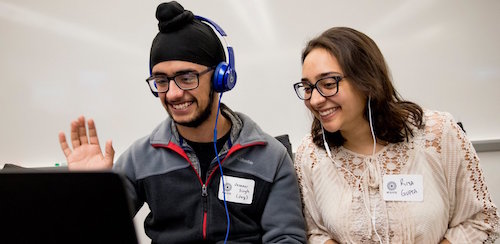
University of Michigan students chat during an M2GATE virtual exchange session.
A Washington, D.C. forum on the positive impacts virtual exchange programs can have on communities and young people worldwide included a panel discussion featuring Amy Gillett, vice president of WDI’s Education initiative.
The forum, “Inspiriting Civic Engagement through Virtual Exchange,” was sponsored by the Stevens Initiative and hosted by the Aspen Institute. It was held May 17-18. The panel discussion is featured below and begins at the 1:23:10 mark.
Gillett discussed WDI’s work this year with the Stevens Initiative on the MENA-Michigan Initiative for Global Action Through Entrepreneurship (M²GATE) program. For the first two cohorts, WDI recruited 111 students from three Michigan universities ― University of Michigan, Wayne State University and Eastern Michigan University ― and 223 of their peers from the participating Middle East and North Africa (MENA) region countries of Egypt, Libya, Morocco and Tunisia. The third and final cohort began May 25 with 60 Michigan students and 151 MENA students enrolled.
For the project, the Michigan-based students were paired with their Middle East counterparts to find entrepreneurial solutions to social challenges in the MENA region. Working virtually, teams of six developed social entrepreneurship projects and accompanying pitches over an eight-week period. Guiding them along the way were instructors, mentors, and successful entrepreneurs from MENA and Michigan. The teams coordinated times for virtual group work and produced a pitch video as a final assignment.
Gillett was joined on the panel by Jennifer Chen of World Learning and Victor Eno of Florida A&M University, leaders at two other organizations that also implemented virtual exchange programs in partnership with the Stevens Initiative. The three discussed why it is important for young people to be active participants in their communities, what they can learn about civic engagement from their global peers and how virtual exchange programs can advance participation.
“This program fundamentally changes participants’ point of view on their role in society by helping them realize that they can be the ones to address issues in society instead of waiting for the government or some other entity to take action, Gillett said. “Some of our participants are starting to refer to themselves as ‘changemakers’ and I think that’s an apt description.”
The Stevens Initiative is an international effort to build global competence and career readiness skills for young people in the United States, the Middle East and North Africa; it is funded by several public and private donors including the U.S. Department of State and the Bezos Family Foundation.
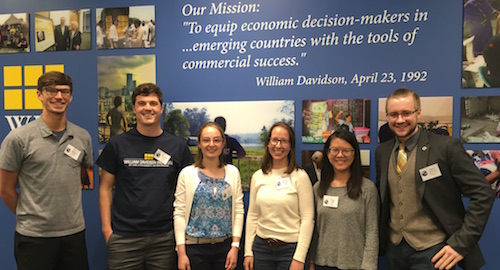
Six U-M graduate students are participating in the 2018 WDI Global Impact Internship program.
When Rebecca Grossman-Kahn was in high school, she was a volunteer with Amigos de las Américas, a youth leadership and cultural exchange program that partners with Plan International, a global development and humanitarian organization. While an undergrad at Stanford University, she worked in Honduras and Nicaragua for the organization.
“I just loved it,” she said. “I loved living in a different place, I loved speaking Spanish.”
So when the Ross School of Business MBA candidate and University of Michigan Medical School student was looking to create her own summer internship, she reached out to several organizations. The first to respond was Plan International, which works to empower children – especially girls.
“They were interested in revamping their evaluation program and I knew WDI worked in performance measurement,” Grossman-Kahn said.
She pitched the partnership to WDI as a student-initiated internship and it was approved. In mid-June, she will head to Brazil to develop a survey tool Plan International will use to assess the impact of their programs. In addition to student-initiated internships, WDI also develops student summer opportunities along with its partners.
Grossman-Kahn is one of six U-M graduate students participating in the 2018 WDI Global Impact Internship program. The students represent the Ross School of Business, the School of Public Health, the College of Pharmacy, the School for Environment and Sustainability (SEAS) and the Medical School. They will work in Brazil, India, Indonesia, Kenya, Namibia and Nepal, and support the work of WDI initiatives in Education and its Entrepreneurship Development Center, Energy, Healthcare, Performance Measurement and Scaling Impact. All of the interns have met with their respective WDI initiative leaders and will continue to keep in touch once in the field.
Colm Fay, who leads WDI’s Energy Initiative, said he is interested in understanding more about access to energy for productive use because of the impact it can have in low- and middle-income countries. Fay will be working with graduate student Matthew Carney, who will be interning at Ecoprise, which designs, builds and installs clean energy products in Nepal for energy-poor communities.
“Matt’s work with Ecoprise will provide important learnings about how an innovative business model to provide energy for agricultural loads can impact rural livelihoods, and how the well-being of these communities can be enhanced through greater access to energy,” Fay said.
Fay also directs WDI’s Scaling Impact initiative and is working on a project in Kenya with intern Andrea Arathoon. He said Scaling Impact wants to develop tools and frameworks that help enterprises achieve sustainability at scale.
“Andrea’s experience with Jacaranda, an organization that is seeking both to scale its operations as well as replicate its approach through partners, will further our understanding of the strategies and resources that are necessary to design business models for scale,” Fay said. “Her work will also provide great insights on how enterprises measure performance in terms of both sustainability and impact, and how best to frame this for investors.”
For Grossman-Kahn, her summer in Brazil will not be her first trip to the country. She lived there while participating in a study abroad program as an undergrad and learned Portuguese. She is looking forward to going back and collaborating with a familiar partner.
Grossman-Kahn said she will split her time between doing high-level strategy work in an office in Sao Paulo and observing Plan International’s programs in rural towns.
“I’m really excited about working with Plan International again,” she said. “They are really mission driven. Everyone in the organization is passionate about the work they’re doing.”
Here are the all WDI interns and their projects:
Andrea Arathoon
School of Public Health
Jacaranda Health
Nairobi, Kenya
WDI Partner: Scaling Impact initiative
Jacaranda Health operates a maternity hospital where it sees more than 2,000 clients a month and wants to create East Africa’s first truly sustainable and scalable maternal health service delivery organization. It is partnering with 15 government hospitals to refine a model for improving quality of maternal healthcare in the public sector.
Andrea will develop the latest version of Jacaranda’s business model and debt/equity financing structure for its next round of investment. She also will assess market and business model opportunities for expansion, improve profitability in the hospital by evaluating new service lines, marketing and customer insights.
Mason Benjamin
School of Pharmacy
WDI & International Pharmaceutical Federation (FIP) Hospital Pharmacy Section (HPS)
Namibia
WDI Partner: Healthcare initiative
FIP is a global federation representing 3 million pharmacists and pharmaceutical scientists worldwide. The Hospital Pharmacy Section’s objectives are to further hospital pharmacy in all its aspects, including the needs of developing countries. FIP, in partnership with WDI, is establishing a collaboration with the University of Namibia School of Pharmacy to increase the capacity of hospital pharmacists in two pilot countries, Namibia and Pakistan, through in-country diagnostics and technical assistance. The summer intern will provide preliminary research on Namibia, which will then inform next steps and content design for this collaboration in pharmacy workforce development.
Mason will develop a landscape analysis of hospital pharmacy practices in Namibia, both at private and public hospitals, in support of a larger pharmacy workforce development goal.
Nadia Putri
Ross School of Business
East Bali Cashews
Bali, Indonesia
WDI Partner: Entrepreneurship Development Center (Education Initiative)
Founded in 2012, East Bali Cashews (EBC) sources sustainably grown cashews from nearby smallholder farmers and processes them in a factory located in a remote village in one of Bali’s poorest regions. Since its launch, the company has integrated various social missions in and around their cashew processing operations, including community improvement and women’s empowerment.
For her internship, Nadia will design a U.S. market entry strategy and actionable roadmap, develop sustainable quality and efficiency improvements and create a food production “best practices” guide. Additionally, in partnership with WDI’s Entrepreneurship Development Center, Nadia will develop a strategy to support EBC’s mission for women empowerment and develop a mini case study how they would achieve it.
Chris Owen
Ross School of Business and School for Environment and Sustainability
Michigan Academy for the Development of Entrepreneurs (MADE)
India
WDI Partner: WDI President Paul Clyde
The Michigan Academy for the Development of Entrepreneurs (MADE) is a U.S.-based nonprofit organization whose aim is to develop entrepreneurs in emerging economies. MADE was founded by the William Davidson and Zell-Lurie Institutes at the University of Michigan and Aparajitha Foundation in Madurai, India. MADE provides Entrepreneurship Development Organizations (EDOs) in emerging economies a repeatable, scalable, transferable and profitable service platform to develop entrepreneurs in their home countries.
For his project, Chris will Identify best practices of existing coaching programs in India and other emerging economies, conduct a needs assessment of entrepreneurs in Madurai and develop a framework and training curriculum for how coaches will be identified, on-boarded and trained. Chris’ work continues a succession of Ross School student teams who have worked with MADE since its launch in late 2017.
Rebecca Grossman-Kahn
Ross School of Business and University of Michigan Medical School
Plan International
Brazil
WDI Partner: Performance Measurement initiative
Plan International is a not-for-profit, non-governmental organization founded in 1937. It is a development and humanitarian organization that advances children’s rights and equality for girls through various programs.
For her internship, Rebecca will develop a tool to assess the social impact of Plan Brazil’s gender equality programs; develop a framework for evaluating impact of violence prevention and girls’ empowerment programs that can be adapted to other partner organizations and in other settings. In addition, Rebecca will also analyze Plan International’s program cost structure and provide recommendations for standardizing and cost savings.
Matthew Carney
Ross School of Business and School for Environment and Sustainability
Ecoprise
Nepal
WDI Partner: Energy initiative
Founded six years ago, Ecoprise designs, builds and installs clean energy products in Nepal for the underserved, energy-poor communities in order to create positive economic, environmental and social impact. Ecoprise recently started AgroHub, a pay-as-you-go service-based business model that aims to provide access to solar-powered infrastructure for remote underserved farming communities. These hubs provide farmers with access to equipment for irrigation, clean drinking water, food-processing and refrigerated post-harvest storage as a service, with ownership of equipment remaining with AgroHub or Ecoprise.
Matthew will develop a theory of change report and a business plan for Ecoprise’s AgroHub model in western Nepal.
Johanna Mendelson Forman is a leading voice in the emerging movement of social gastronomy. She visited WDI and the University of Michigan in March to discuss how food can promote social good. She also leads the gastrodiplomacy programming for the U.S. State Department-funded project “Livelihoods Innovation through Food Entrepreneurship,” or LIFE project, implemented by a consortium, which includes: Center for International Private Enterprise (CIPE), IDEMA, The Stimson Center and WDI. The LIFE project aims to develop sustainable livelihoods in the food sector for Syrian refugees, other refugee groups, and their host communities in Turkey. While at WDI, Mendelson Forman, a distinguished fellow at the Stimson Center where she heads the Food Security Program, was interviewed by Kristin Babbie Kelterborn, senior project manager at WDI.
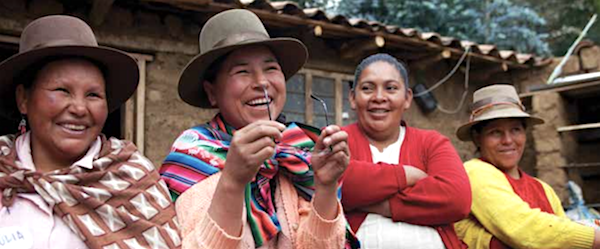
Women working with Chakipi Acceso in Peru. Image courtesy of Chakipi.
Note: The following post was co-written by Rebecca Baylor, Heather Esper and Yaquta Kanchwala Fatehi of WDI’s Performance Measurement Initiative. It was originally published on NextBillion.net, which is managed by WDI.
For many businesses and organizations, the idea of measuring their impacts is usually one of three things: scary, elusive or just plain boring. To make matters worse, evaluators have a rotten reputation for using too much annoying technical jargon. While there is some truth to these stereotypes, it doesn’t have to be all bad.
Our work demonstrates that it is possible to bridge the gap between people and metrics in a meaningful way.
In fact, our team at the William Davidson Institute recently released an impact report that demonstrates how we guided three organizations on how to demystify data collection of their social impacts. We worked with senior level leadership to develop strong surveys and data collection processes suited to their context. Perhaps more importantly, we openly discussed their measurement concerns and made explicit– dare we say, energetic– connections between their impact metrics and organizational strategy.
A key theme throughout this project was our goal to combine social and business metrics. When organizations – from enterprises to impact investors – actually track these types of combinations, which we refer to as “power couples,” they can absorb unique insights to solve key business challenges while communicating impact evidence. Through our work, we have encountered a number of social + business metric power couples that we’ve seen influence internal decision-making at organizations and improve results. Creating these power couples enables managers to more holistically harness their data to better meet business goals and increase intended impacts. For example, employee retention, an all-important business metric, may be affected by the impact that an organization has on the quality of life of their employees’ children, a social metric. This may be especially true for low- or middle-income employees.
Here are just a few common power couples that we identified during this project (detailed in the report) and others.
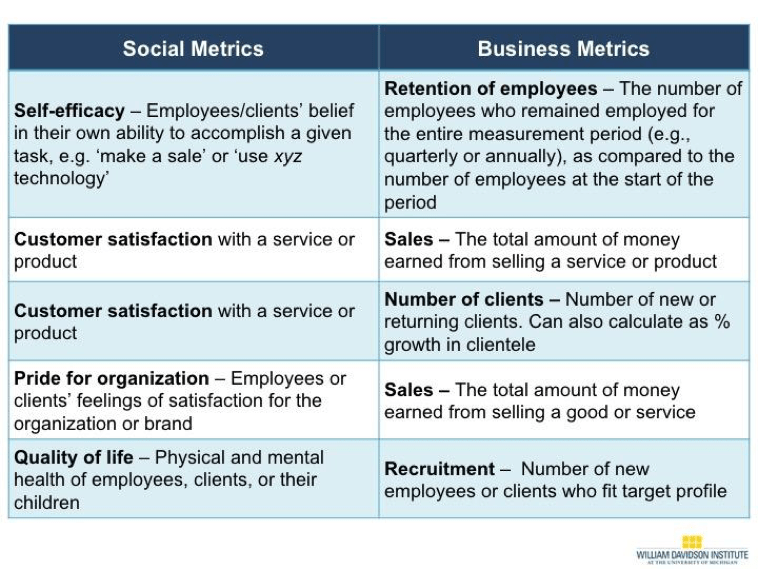
This list is just a start.
Selecting metrics takes time and patience. Indeed, finding the right metrics can be a lot like parenting. There isn’t one perfect formula and your strategy will likely evolve over time. However, we recommend businesses and investors interested in seeing social or environmental impact use some of the following strategies to make their job easier. We’re also including relevant resources to help you apply these strategies:
We hope these combinations excite you and inspire you to create a few social + business metrics of your own. Also, check out our case study for five lessons learned to accelerate successful impact measurement as an investor or investee. And if you enjoyed this post, share it, tweet it, or comment below! We’re also very curious about what social + business metric combinations have or haven’tworked for you. We look forward to hearing from you.
See? Impact measurement isn’t as scary (or as boring) as it may first seem.
Rebecca Baylor is a research associate for the Performance Measurement Initiative.
Heather Esper is the senior program manager for WDI’s Performance Measurement Initiative.
Yaquta Kanchwala Fatehi is a program manager for WDI’s Performance Measurement Initiative.
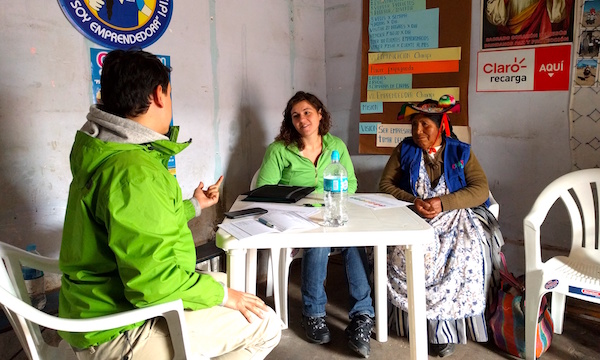
Many organizations working with small businesses in low-income countries struggle with how to separate powerful, but anecdotal, stories from true social impact that can be replicated.
The newly released WDI Impact Report, “Positive Change Through Actionable Metrics,” reviews the work of the Institute’s Performance Measurement Initiative (PMI) while pilot-testing a new framework in Brazil, Nicaragua and Peru designed to increase the impact of small, inclusive businesses and their distribution networks.
The latest report traces WDI’s work back to a 2015 Mexico conference sponsored by the Inter-American Development Bank (IDB) where WDI Senior Program Manager Heather Esper debuted the new framework, which includes a mix of standardized social and business metrics over the short and long term. There was great interest in having WDI pilot the framework with different micro-distribution organizations in IDB’s SCALA network, which brings together anchor companies, microfinance institutions, academia and non-governmental organizations to combine efforts to grow inclusive distribution networks.
Three SCALA network organizations were selected – Supply Hope in Nicaragua, Chakipi Acceso in Peru and Kiteiras in Brazil – and WDI went to work to identify indicators from the framework that would properly reflect the impact on the micro-distributors for each venture. The team also developed context-specific collection plans for gathering the necessary data. This helped the enterprises increase their data collection skills, and allowed WDI to test how much practical guidance future organizations would need if they were using the framework.
 “We are pleased to release this impact report that highlights our work with three great organizations to achieve measurement that is actually meaningful to them,” said WDI Research Associate Rebecca Baylor. “The teams we worked with deserve a lot of credit for the success of this project. So many organizations are struggling with how to measure their impacts, and these teams were willing to have in-depth conversations and reflect on their data collection practices.”
“We are pleased to release this impact report that highlights our work with three great organizations to achieve measurement that is actually meaningful to them,” said WDI Research Associate Rebecca Baylor. “The teams we worked with deserve a lot of credit for the success of this project. So many organizations are struggling with how to measure their impacts, and these teams were willing to have in-depth conversations and reflect on their data collection practices.”
As the report chronicles, WDI developed surveys for the three organizations and helped them collect and analyze the data. The work culminated in a set of recommendations for the three organizations to apply in future impact measurement activities. All three gained a better understanding of how to measure changes in the well-being of their micro-distributors.
“They were committed to building their capacity for making decisions with the data they collect,” Baylor said. “This report shares the process we went through together and will be valuable for other organizations who are striving to accomplish the same.”
It’s the second report in an ongoing series that chronicle the long-term impact WDI is having in certain sectors or geographies. The first WDI Impact Report, “Improving Business Education in the Philippines,” debuted in March 2017. It examined the Institute’s contributions to the five-year STRIDE project that focused on strengthening the science, technology, research and innovation capacity on the island nation.
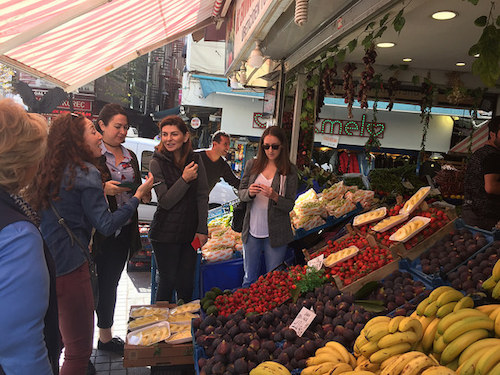
Members of the LIFE project consortium visit a produce stand in Turkey and interviews the owner on how a green grocer sources his produce and his perspective on how he could potentially benefit from the LIFE Food Enterprise Center.
Food can be a powerful means to a more peaceful world because it encourages conversation, cross-cultural engagement and understanding during troubled times, according to the next speaker for the WDI Global Impact Speaker Series.
Johanna Mendelson Forman, a leading voice in the emerging movement of gastrodiplomacy and social gastronomy, will talk about how food can promote social good at her talk, “Can a Hamburger Build World Peace? Lessons on How Food Builds Community One Plate at a Time.” Her talk will be at 5 p.m. on Wednesday, April 4 in Room R2220 at the Ross School of Business. It is free and open to the public.
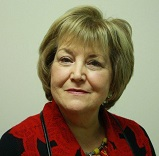
Mendelson Forman
Mendelson Forman said a revolution is building in which food has become a vehicle for a generation that features chefs as political actors, farmers as champions of environmental sustainability and businesses that have embraced the belief that investment in the entire supply chain is good for business. Young social entrepreneurs are combining food and their business expertise to promote social good with new apps and new inventions. Refugees are learning to cook in their new land in order to gain respect and sow hope.
“Everyone has memories about dishes they ate growing up,” said Kristin Babbie Kelterborn, a WDI senior project manager. “Many times, these recipes have been passed down through generations, giving us a way to feel connected to our culture, bond with others and shape our identity. In many cultures, food is incredibly significant; it is a way of showing hospitality, love and respect.”
“Dr. Mendelson Forman’s presentation will provide insight on what happens when people from different backgrounds share their food cultures with one another. She will talk about a food entrepreneurship project that WDI is currently involved in, which uses food to promote cross-cultural exchange between refugees and host communities in Turkey.”
Under WDI’s Entrepreneurship Development Center, Kelterborn is working on a project, led by the Center for International Private Enterprise and implemented with a consortium of U.S. and Turkey-based partners that aims to develop sustainable livelihoods in the food sector for Syrian refugees and their host communities in Turkey. The project, “Livelihoods Innovation through Food Entrepreneurship,” or LIFE, is establishing Food Enterprise Centers in two Turkish cities to provide business support services to 240 entrepreneurs over two years. The centers will serve as incubators, offering kitchen space and business support services. In addition, the centers will host gastrodiplomacy events using food as a means to promote cross cultural understanding. Mendelson Forman is leading the gastrodiplomacy component of the LIFE project. Sponsored by the US State Department, the consortium includes partners IDEMA (International Development Management), Union Kitchen and The Stimson Center, as well as CIPE and WDI.
Mendelson Forman is an adjunct professor at the School of International Service at American University in Washington, D.C. where she created an interdisciplinary course, Conflict Cuisine®: An Introduction to War and Peace Around the Dinner Table. She is a distinguished fellow at the Stimson Center, where she heads the Food Security Program.
She also has written extensively about food, conflict and Latin America, and has lectured on food-related topics at the Smithsonian Resident Associates Program, Johns Hopkins University Bologna Campus, New York University’s Washington Program and at the United States Pavilion of the 2015 World Expo in Milan, Italy.
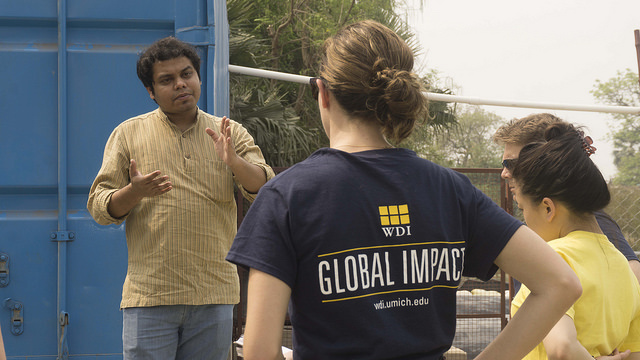
From a 2017 WDI-sponsored MAP team.
WDI’s partnership with Aravind Eye Care System dates back to 1999. Over the years, the organization has utilized a combination of student MBA teams and other engagements with the Institute to explore new ideas for growing strategically and improving operations at its hospitals and clinics, which offer world-class eye care at affordable prices.
Just a few of those completed projects include determining the appropriate governance structures for Aravind, consulting on expanding geographically and growing eye care services, implementing improved operational processes, delivering HR capabilities and leadership training for physicians, and improving the culture and patient experiences. Each of those projects were sponsored by WDI as part of the Ross School of Business’s annual Multidisciplinary Action Projects (MAP).
In 2016, a student team customized and tested an existing process model at select Aravind facilities that measured performance of each unit in terms that everyone in the organization could understand. Last year, the Aravind MAP team worked with senior leadership to develop a roadmap for the eyecare system’s future growth.
MAP is an action-based learning course offered at Ross in which MBA students receive guidance from faculty advisors. Each project requires analytical rigor, critical thinking, and teamwork. (Find out more about WDI’s MAP projects over the years here.)
After learning about their projects and conducting secondary research for several weeks, the students spend two to four weeks working with their organizations in the field.
In March, a MAP team (one of nine sponsored by WDI) will travel to Chennai, India to work at Aravind’s largest facility, which opened in September 2017 and offers the usual suite of services to patients, including specialty eye surgeries. As the new facility nears its six-month anniversary, administrators are studying patient care and looking for areas of improvement.
The students, as part of their overall work to enhance the patient experience, will work with Aravind leadership to develop recommendations on how to transition some of the work performed by eye specialists to general ophthalmologists, who are currently underutilized. Before heading to Chennai on March 17, the team will meet with faculty at the University of Michigan’s Kellogg Eye Center to hear how they manage similar issues.
Members of the MAP team said they are eager to observe the Aravind business model, which student Gerard Heath called “a leader around the world in developing solutions to provide high quality care in low-resource environments.” They all think the experience and work at Aravind will help them in the classroom as they finish up their studies, and may help inform their future career paths.
Kelsey Wyatt-Mair said she is interested in operations and “learning from this hands-on experience will equip me for later in my career, whether it’s in or out of healthcare.”
And Katie Zurales is “excited to see a different healthcare system” and how high quality, cost-effective healthcare “translates to different cultures.”
Of the four team members, which also includes Daniel Semaan, only Wyatt-Mair has some international work experience.
“It will be interesting for all of us – how to navigate that culture,” Wyatt-Mair said. “We’ll get exposed to the similarities and differences of Aravind with, say, Kellogg Eye Center.”
In between the work, the group plans to explore some local temples and beaches and perhaps travel to other cities. They said they were excited to discover Chennai was listed as one of the world’s best “food cities.”
WDI Initiatives often recruit partner organizations to work with MAP teams. The Aravind project is aligned with the Institute’s Healthcare Initiative. Similarly, WDI’s Education Initiative is working with the MAP team assigned to the Technological Institute of the Philippines (TIP) project. The students will create a strategic plan for a newer TIP initiative to improve the engineering and technology skills of students.
Amy Gillett, vice president of WDI’s Education Initiative, said MAP teams are one of the ways the initiative can improve the delivery of management education in emerging markets.
“The MAP teams bring new perspectives to universities in emerging markets,” she said. “They help university leadership think in different ways about how to expand into promising new areas or how to think strategically about growing an existing department or initiative. We’re so pleased to have this opportunity to unite MBA students – with their passion for social impact and their strategic thinking – with our university partners who welcome fresh insights.”
Like many of the Institute’s MAP partners, TIP has collaborated with WDI in the past. TIP was one of three university partners that worked with WDI on the STRIDE project.
“We’re so pleased to continue our successful partnership with TIP,” Gillett said. “During a recent trip to Manila, I had the opportunity to meet with TIP’s leadership. I was really impressed by their commitment to providing access to a college education for underserved communities as well as by their drive to continuously improve their operations and the services they offer to students.”
Here is a summary of each WDI-sponsored MAP project:
Aparajitha Foundations – India
Advisors: Paul Clyde, WDI and Ross School of Business; Stewart Thornhill, Zell Lurie Institute for Entrepreneurial Studies and Ross School of Business
MAP Team: Amirah Patterson, Riki Smolen, Robert Mack, Nathan Stevens
Aparajitha Foundations is a charitable trust that supports the less privileged, mainly in the areas of education and health.
The team will co-create alongside the founding team of the Michigan Academy for the Development of Entrepreneurs (MADE) as they test, validate, and iterate on MADE’s business model and product prototype for supporting entrepreneurs and Small Medium Enterprises (SMEs) in Madurai, India. MADE is a nonprofit institute established at the Ross School of Business by the Zell Lurie Institute for Entrepreneurial Studies, in partnership with WDI and Aparajitha Foundations, that works with entrepreneurship development organizations in developing countries to give individuals operating businesses in these environments the knowledge and best practices they need to thrive.
Aravind Eye Care System – India
Advisors: Paul Clyde, WDI and Ross School of Business; Jim Walsh, Ross School of Business
MAP Team: Gerard Heath, Katie Zurales, Daniel Semaan, Kelsey Wyatt-Mair
Aravind Eye Care System is a vast network of hospitals, clinics, community outreach efforts, factories, and research and training institutes in south India that has treated more than 32 million patients and has performed 4 million surgeries since its 1976 founding.
The MAP team will develop a framework for integrated patient care service delivery.
CURE International – Ethiopia
Advisors: Paul Clyde, WDI and Ross School of Business
MAP Team: Simon Kaufmann, Keegan McQuillan, Alan Wisniewski, Brandon Yelen
CURE operates clubfoot clinics in 17 countries around the world, each tasked with helping children and families deal with the congenital deformity that twists the foot, making it difficult or impossible to walk. In Ethiopia, CURE manages 37 clinics.
The MAP team will work to improve quality and increase scale of leg brace production in Ethiopia.
Ghana Emergency Medicine Collaborative – Ghana
Advisors: David Butz, WDI and Ross School of Business; Jim Walsh, Ross School of Business
MAP Team: Alexander Ukoh, Liam Kraft, Kartik Raju, Shreyance Mandaliya
The Ghana Emergency Medicine Collaborative aims to improve emergency medical care in Ghana through innovative and sustainable training programs for physician, nursing and medical students. The goal of the training programs is to increase the number of qualified emergency health care workers retained over time in areas where they are most needed.
The student team will investigate the feasibility of incorporating mobile payments into the emergency department workflow, including an analysis of how that will impact both the finances and operations of the department.
Imperial Logistics – South Africa
Advisors: David Butz, WDI and Ross School of Business; Ravi Anupindi, Ross School of Business
MAP Team: Justin Loescher, Jasmine Knowles, Courtney Alexander, Javier Castillo
Imperial Logistics provides logistics and supply-chain management across the African continent, and is a leading distributor of medicines and healthcare products.
The MAP team will establish an African Pharmaceutical Wholesaler Association (APWA).
Outbound Initiative – Brazil
Advisors: Paul Clyde, WDI and Ross School of Business; Stewart Thornhill, Zell Lurie Institute for Entrepreneurial Studies and Ross School of Business
MAP Team: Tsering Sherpa, Daniel Vergara Ramirez, Dale Jarosz, Varun Haralalka, Agustin Sosa, Mike Porcelli
Outbound Brasil uses the latest technology to identify global opportunities and resources for the growth of innovative and high impact business in that country, such as new and better markets, customers, partnerships, investments and awards.
The team will conduct a situation analysis on the Brazilian tech investment scenario and make recommendations for which innovations could make smart money more accessible to local startups.
REFRESCH – Gabon
Advisors: Paul Clyde, WDI and Ross School of Business; Bob Dittmar, Ross School of Business
MAP Team: Alena Golovchenko, Felipe Prieto Nunez, Sean Welsh, Allie Murphy
REFRESCH (Researching Fresh Solutions to the Energy/Water/Food Challenge in Resource Constrained Environments), is a consortium of educators and researchers working to improve the lives of those living in resource-constrained communities. Its goal is to find solutions to challenges in the areas of food, water and energy. It is funded by the University of Michigan Third Century Initiative and is headquartered at the University of Michigan Energy Institute.
The student team will identify a set of commercially viable business model archetypes or templates to increase access to renewable energy products and services in Gabon. They also will develop a recommendation on the most likely template to be profitable. A secondary goal is to understand the entrepreneurial skills and capabilities required to launch and operate such enterprises.
Technological Institute of the Philippines (TIP) – Philippines
Advisor: Paul Clyde, WDI and Ross School of Business
MAP Team: Joseph Grandominico, James Schoen, Alexa Thomas, Charlton Washington.
The Technological Institute of the Philippines (T.I.P.) is a leading private tertiary education institution that specializes in engineering and technology courses, and has an enrollment of 25,000 students on campuses in Manila and Quezon City. In 2016, the school launched T.I.P. TechnoCoRe, which aims to develop engineering and technology students’ skills in problem-business opportunity formulation, ideation, validation and execution – the core skills of technopreneurship.
The student team will create a strategic plan for T.I.P. TechnoCoRe.
Vayu Inc – Senegal
Advisor: Paul Clyde, WDI and Ross School of Business
MAP Team: Alexander Franczyk, Brandon Pickett, Adam Ronk, Adam Woodruff.
Vayu has developed an unmanned aerial vehicle (UAV) that can be used to deliver needed medical supplies and products to remote areas. The UAV launches and lands like a helicopter and flies like an airplane once off the ground. It can fly 100 kilometers and hold just over two kilograms of payload.
The team will conduct market analysis and develop an entry strategy for introducing delivery UAVs into Senegal’s market.
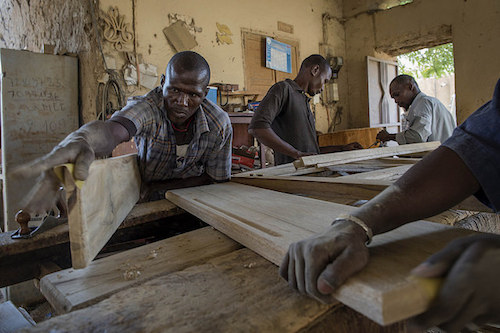
Top image: Employees from different ethnic groups are seen at work at a carpentry in Gao, Mali. Flickr credit.
Note: The following interview was conducted by Ekta Jhaveri, senior research associate for the Healthcare and Financial Sector Development Initiatives at the William Davidson Institute at the University of Michigan. The article originally appeared on NextBillion, which is managed by WDI.

By Ekta Jhaveri
Many small and medium-sized enterprises (SMEs) in developing countries face a classic conundrum when it comes to securing finance. Most constitute the “missing middle,” as they are considered too big for microfinance institutions (MFIs) and too small or risky for traditional finance providers such as commercial banks.
This dilemma is well known, but to truly solve it, we need to know more. To get a deeper understanding of the missing middle SME sector, (which for the purposes of this article we refer to as MM-SME), and how to support it, the Dutch Good Growth Fund (DGGF) commissioned several studies on the entrepreneurial ecosystems of six francophone West African countries – Benin, Ivory Coast, Guinea, Mali, Senegal and Togo. The reports were published as part of DGGF’s #ClosingTheGap series, with research for the country studies conducted by Enclude.
I recently interviewed Julia Kho, knowledge manager at TripleJump, an investment management and advisory services firm that, along with PricewaterhouseCoopers, manages DGGF’s Investment Funds Local SMEs effort.
Ekta Jhaveri: Why was the francophone West African region chosen by DGGF for #ClosingTheGap studies?
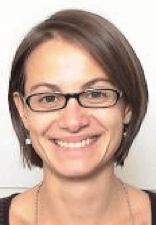
Julia Kho
Julia Kho: The DGGF supports financial intermediaries across the developing world, the mandate covers 68 countries in total. Local financial stakeholders reach out to DGGF for funding support. We received very few proposals from this region. That is why DGGF commissioned these studies to get a better understanding of the SME landscape and the ecosystem around them. The intent was to identify, elaborate on and strengthen existing and potential solutions – including fostering the appetite of investors in investing in local SMEs in the region – to address key challenges and obstacles faced by the missing middle entrepreneurs. Now we see more fund managers addressing this market and expect more activity in the coming years.
EJ: Can you briefly describe the process of entrepreneurial ecosystem assessments?
JK: The entrepreneurial ecosystem assessments were conducted using the ecosystem toolkit created by the Aspen Network of Development Entrepreneurs (ANDE). It involves analyzing the ecosystem along six dimensions or domains – culture, policy, markets, finance, support and human capital. A literature review was followed by field visits to conduct interviews with the stakeholders from the various domains. The fieldwork was followed by a workshop of key stakeholders to discuss findings and possible solutions to close the identified gaps along the six domains.
EJ: How do you characterize or define the missing middle SMEs in francophone West Africa? Were these SMEs homogenous across the six countries?
JK: The starting point of our definition of the MM-SMEs was the one mentioned above. We found that it was important to sub-segment the MM-SME sector in order to get a deeper understanding of the characteristics of local enterprises and their needs and regroup them under clusters that share these common characteristics and needs. The sub-categories we came up with are fairly general and they can be applied across countries; where they differ is around the relative representation of the sub-category by country. So, even though the markets in each of the six francophone West African countries differ, at a high level this sub-segmentation of the SME sector applies. The sub-segments we defined and found were a very large cluster of small necessity entrepreneurs (established for the sake of providing livelihood) followed by moderate growth entrepreneurs (mainly family-owned businesses), and smaller clusters of high-growth startups (young entrepreneurs mainly in the technology sector), opportunity-driven SMEs (entrepreneurs copying successful business models and involved in several businesses) and gazelles (successful startups with high growth rates).
While this sub-segmentation of the SME sector is an important exercise, we are now embarking on a deeper study with the Omidyar Network and DGGF. Its goal is to create a robust segmentation framework of SMEs, which will help investors and intermediaries match appropriate financial products with different enterprise segments, as well as help entrepreneurs understand the most appropriate investors to target.
EJ: Were the challenges more systemic or operational? Can you elaborate on the top three challenges across the six countries?
JK: Both – systemic and operational. While there is some variation across these countries, the few general challenges we saw were:
EJ: Were there any surprising findings from the entrepreneurial assessments you conducted with SME owners? Can you elaborate on a couple of these findings?
JK: I don’t know if these are specific to the region but we found a couple of things that were very interesting if not surprising. First, there is no shortage of dynamic entrepreneurs. The challenge lies in how they look at their business and in understanding their own needs. Entrepreneurs tend to talk about the need for external finance to grow their business. But often when discussing their business further, it appears that the first need is to secure recurring customers to sustain regular revenues and then think about finance, i.e. what type of financial support they need for which purposes. In the region, given the current financial service offerings, we identified that stakeholders are aware of debt products but their exposure to other financial instruments and products is extremely limited and hence their understanding of those, too.
Another finding is related to the varied level of professionalism and sophistication of local businesses. Keeping records of levels of production and supply needs, for instance, and analyzing those to identify what is needed not just to operate tomorrow, next week or next month but rather the next year, is not necessarily a common practice.
EJ: What are the different types of stakeholders (financial and non-financial) that provide support to SMEs? What is the level of collaboration among them?
JK: In addition to what was said earlier on the current financial offers, we identified a gap in financing at the very early stages of development of local enterprises. There are barely any players that can offer external funding (that is not collateralized debt) in the range of 10,000-1 million euros.
On the non-financial side of things, again, in addition to what was said earlier, we see a positive trend of one-stop shops being set up to provide information for local businesses such as how to register, etc. However, besides the few traditional business support development service providers that can be expensive, full-fledged service providers that help entrepreneurs – from the conceptual to commercialization stage – at affordable prices are extremely limited.
As a direct response to this identified gap, DGGF is supporting Suguba, a network of impact hubs that originated in Mali and which are looking to expand to Senegal and Ivory Coast. We are also supporting EtriLabs, a tech innovation hub in Benin and Innov’Up, a women-focused incubator in Togo.
As in many ecosystems, we observe that local stakeholders tend to be disconnected. If the SME sector is not sub-segmented based on characteristics and needs of local enterprises, then the service offering is not targeted and specialized, which makes collaboration challenging. Our work with Omidyar Network (mentioned above) is important as it will provide an understanding of the appropriate financial products based on different enterprise segments.
EJ: A pilot study for the #ClosingTheGap series was done for Kenya in 2015. Are there any learnings from the Kenyan entrepreneurial ecosystem assessment that can be applied to these six countries?
JK: There is no one-size-fits-all approach. There are many variations across the countries and Kenya has an ecosystem that tends to be more dynamic than the six countries we’re discussing. What we learnt was that the sub-segmentation methodology piloted in Kenya was applicable to any other market and that the sub-segments defined through the Kenyan study were also relevant to the francophone West African markets, although the relative proportions of SME sub-segments representation are different. The entrepreneurial culture is promoted in Kenya. There is diversity in terms of ecosystem players: MFIs, banks, mezzanine/venture capital/private equity funds, hubs, incubators and accelerators – and they intervene at different stages of maturity of the enterprises. We saw some linkages with universities (e.g. a hub or incubator hosted by a university). In fact entrepreneurship education is part of some high school/university curricula, which we don’t see in francophone West Africa.
EJ: What other types of innovative financial instruments have the potential to increase access to finance for such SMEs – and which types of financial institutions are best positioned to fill this need?
JK: There are steady moderate growth companies, often family-owned, whose service or product offerings address a market demand but they may still lack the track record, collateral, cash flow or profit levels that can qualify them for a bank loan. These companies require more risky (less collateralized), flexible and long-term capital to grow. This is what we refer to as “mezzanine finance,” which blends elements from traditional private equity and debt financing into a unique product. DGGF commissioned a study in 2016 that dives into this interesting additional offering for missing middle entrepreneurs and seems relevant to local enterprises in the region.
EJ: There is a lot of talk in the development community about the use of blended finance for the missing middle SMEs. What are your thoughts on this?
JK: The concept of blended finance is an interesting one. We see it as particularly relevant to foster innovations, i.e. to test and launch new and different financial products and models. In my mind, local intermediaries – both financial and non-financial ones – would benefit from this type of financial support to try out and identify what works/does not.
All the reports under the #ClosingTheGap series can be accessed on the DGGF website.
Ekta Jhaveri is senior research associate for the Healthcare and Financial Sector Development Initiatives at the William Davidson Institute.
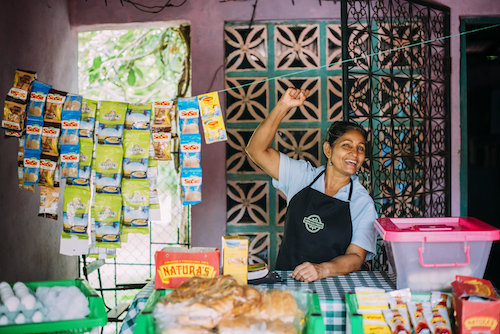
Image credit: Dani Cowan/Supply Hope
A new case study authored by WDI’s Performance Measurement Initiative (PMI) that gives advice to impact investors and investees on new and emerging ways to strengthen their impact measurement practices will be released at two major, international conferences this week.
The case, “Accelerating Measurement within Impact Investing: Five Critical Lessons,” will be shared with attendees at the Latin American Impact Investing Forum (FLII) in Merida, Mexico and the Aspen Network of Development Entrepreneurs (ANDE) “Metrics from the Ground Up” conference in Nairobi, Kenya. It tracks the WDI team as it pilot-tested its new impact measurement framework with three social enterprises in Nicaragua, Brazil and Peru, and provides recommendations to strengthen the impact measurement practices of investors as well as the enterprises they support.
“We are excited to release the case study at these conferences because the five key lessons will be familiar to many in attendance, and may provide useful insights to related measurement challenges they are facing,” said Heather Esper, senior program manager for PMI. “At the FLII event, the attendees will be impact investors or those working with them. The report, which we’re also releasing in Spanish, will be directly relatable to them and provide guidance on how to address key obstacles they encounter when trying to measure the ‘impact’ in impact investing.”
Esper will be joined at the FLII event by Diana Paez, director of WDI’s Grants Management department, to meet with potential partners who are interested in carrying out work similar to the pilot projects featured in the report.
PMI Program Manager Yaquta Kanchwala Fatehi will participate in the ANDE conference, where presenters and the audience will share experiences about different approaches to evaluation, the challenges each approach presents and building bridges between different approaches.
“We will also look to identify potential strategies to address those challenges in the different contexts where participants have done measurement and evaluation,” Fatehi said.
WDI’s case study comes at an opportune time as the call for better impact measurement grows globally. A December 2017 ANDE report found that more than half of the member organizations they surveyed have no full-time staff person dedicated to measurement. Additionally, nearly all respondents spent less than 5 percent of their annual budget on measurement.
Similarly, in a recent report by the Global Impact Investing Network (GIIN) many survey respondents said measurement issues, as opposed to management concerns, were a big challenge. In the GIIN survey, 43 percent of respondents cited significant challenges in collecting quality data, while 32 percent said aggregating, analyzing, and/or interpreting data across a portfolio was a problem for them.
For WDI’s report, the PMI team identified five valuable lessons they learned from working on the three pilots. They are summarized in the table below.
| Recommended activity | Value for Impact Investors and Social Enterprises |
| Use standard indicators, not standard measures | Contextualize data collection to ensure accurate data |
| Use a Theory of Change | Articulate impact, decide what to measure, assign indicators |
| Support M&E capacity building techniques | Speak the same language, conduct M&E without external teams, maintain sustainable M&E practices |
| Mix social outcomes with key business performance indicators | Strengthen mission and ability to scale |
| Foster a senior-level staff as a M&E champion | Help facilitate embedding of data collection into existing business processes |
Rebecca Baylor, a PMI research associate, said the recent reports highlighted the need for businesses and impact investors to reconsider and re-energize how to incorporate measurement into their own practices.
“Our team is excited to engage in that conversation by sharing experiences from our own work,” she said. “Our case study not only speaks to the struggles of individual businesses but also generalizes findings about how to incorporate measurement at scale across multiple similar enterprises.”